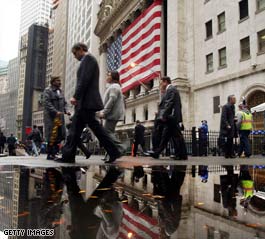Company of the Year: Nasdaq
Daniel Fisher, 12.18.08, 06:00 PM ESTForbes Magazine dated January 12, 2009
Under CEO Bob Greifeld, NASDAQ OMX plays the stock trading game better than anybody.

The market has been open less than two hours and already 900 million or so shares worth $25 billion have changed hands. In a given second the total jumps by $3 million to $5 million--all without a sound. Unlike the New York Stock Exchange a few blocks away, this exchange has no shouting traders, no crumpled trade tickets on the floor. At the Nasdaq OMX Group, a single technician sits in front of eight flat-panel computer screens in a quiet operations center, 51 stories above the World Trade Center construction site. On one screen, quotes blink on and off at speeds barely visible to the human eye. On another, a fever chart showing orders and completed trades scrolls along like the electroencephalogram of an agitated 2-year-old.
To the extent that the Nasdaq market exists anywhere, it's within a single rack-mounted Dell server in a rented data center somewhere across the Hudson River. That machine routinely processes 70,000 orders, cancelations and trades per second but can handle up to 250,000 per second--enough to deal with trades on the Nasdaq plus the London and Paris stock exchanges with room to spare.
An entire trading floor crammed into a suitcase-size computer: That's the future of exchanges, and Nasdaq was there first, having been all-electronic--floorless, that is--since its inception in 1971. In the early days the trades were by telephone; since 1983 they have consisted of computer clicks.
With roughly 33% of the total volume in U.S. equities, and 2,500 employees, Nasdaq OMX is rushing to push more stock trades as well as futures, options and other derivatives onto its superfast, supercheap servers before competitors like NYSE Euronext catch up. "As you add scale, your incremental cost goes to zero," says Robert Greifeld, 51, a former computer salesman who took over at Nasdaq in 2003 as it was being spun out of the old National Association of Securities Dealers, now the Financial Industry Regulatory Authority. "Our goal is to add more incremental trades at zero cost."
In a year of spectacular market meltdowns, Nasdaq OMX Group has capitalized on the turmoil. It is our Company of the Year.
The chaos in financial markets--to say nothing of exploding volatility--has been a windfall for exchange operators. Combined U.S. trading volume on all exchanges averages 10.6 billion shares a day, compared with 4.2 billion two years ago and 1.5 billion a decade ago. The recent increase in volume is accompanied by an explosion in volatility: The CBOE Nasdaq Volatility Index, reflecting short-term expectations of volatility in the Nasdaq 100 Index, surged to 80 from 20 or so between mid-2006 and October of last year. At four-hundredths of a penny per share, Nasdaq takes in $800,000 in fees on a 2-billion-share day, just for pushing electrons through its servers.
But there's more competition for that traffic. A 2007 federal regulation ordered brokers to route their trades to the cheapest exchange, not the one that is most convenient. In Kansas City, Mo., Bats Exchange, a three-year-old competitor, now handles approximately 12% of U.S. volume, including 12% of the trading in Nasdaq-listed shares.
Traders are also doing 7% of their volume in "dark pools," the electronic equivalent of a back alley where buyers and sellers transact anonymously, according to Tabb Group, a Westborough, Mass. market researcher. "People used to talk about each stock having a principal exchange," says Daniel Mathisson, managing director in charge of a Credit Suisse division that uses computers to direct trades to the lowest-cost exchange at any given moment. "Now the trading's going all over the place, and there is nothing to stop that trend."
So Greifeld plays offense, using cheap technology to get business. In 2005 he paid $935 million for Instinet Group, one of the largest electronic exchange operators, chiefly to get his hands on the Island trading engine, particularly fast and inexpensive technology developed by a young Brooklyn, N.Y. entrepreneur in the mid-1990s. Within months Greifeld scrapped Nasdaq's expensive Tandem computers in a Connecticut data center and moved Nasdaq to off-the-shelf servers. "We have to have the same cost structure as the startups--we can't give any quarter," he says.
'Business' 카테고리의 다른 글
| Stumbling Giants: EA And Take-Two (0) | 2008.12.24 |
|---|---|
| Life In A Recession (0) | 2008.12.24 |
| No Happy Holidays For U.S. Housing (0) | 2008.12.24 |
| Smart Tax Moves To Make Right Now (0) | 2008.12.22 |
| Sex And Recession (0) | 2008.12.22 |






Comment On This Story